Search
Summary 
Loading AI-generated summary based on World History Encyclopedia articles ...
Search Results
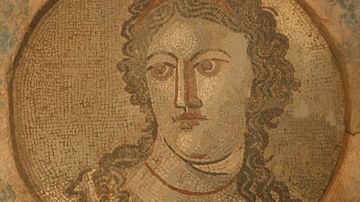
Image
Roman Mosaic of Mnemosyne
A Roman mosaic of the Titan Mnemosyne (Memory), mother of the nine Muses. 2nd century CE, Tarraco. (Archaeological Museum, Tarragona, Spain)

Article
A Visual Who's Who of Greek Mythology
Achilles The hero of the Trojan War, leader of the Myrmidons, slayer of Hector and Greece's greatest warrior, who sadly came unstuck when Paris sent a flying arrow guided by Apollo, which caught him in his only weak spot, his heel. Adonis...

Article
Hesiod on the Birth of the Gods
The Greek poet Hesiod (c. 700 BCE) is most famous for his works Theogony and Works and Days. In this passage from Theogony, Hesiod relates the birth of the gods from cosmic Chaos and follows the lineage through the great Zeus, King of the...
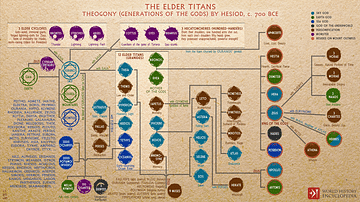
Image
Theogony's Elder Titans
An infographic illustrating the family tree of Greek mythology's 12 Elder Titans, offspring of primordial deities Gaia (Earth) and Ouranos (Sky), a golden race of immortal, pre-Olympian gods and their descendants. It is broadly accepted that...

Definition
Zeus
Zeus was the king of the 12 Olympian gods and the supreme god in Greek religion. Zeus is often referred to as the Father, as the god of thunder, and the 'cloud-gatherer'. Zeus controlled the weather and offered signs and omens. Zeus generally...

Definition
Cronus
In Greek mythology, Cronus (also spelt Kronos) is a Titan and the youngest son of Uranus (Heaven/Sky) and Gaia (Earth). He dethroned Uranus and became the world's first king, ruling over his siblings and fellow Titans. Cronus married his...

Definition
Gaia
Gaia (also Gaea or Ge) is a primordial goddess and the personification of the Earth in Greek mythology. Gaia emerged from Chaos and is considered the supreme or mother goddess by immortals and mortals alike. All gods and goddesses are descended...
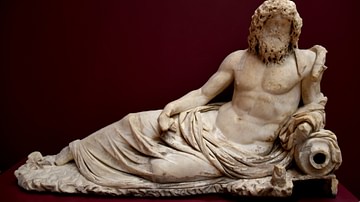
Definition
Oceanus
Oceanus (also Okeanos) was the eldest of the Titans and a son of Uranus (Heaven) and Gaia (Earth) in Greek mythology. He was the god and personification of the freshwater river Oceanus, which was thought to encircle the earth and was said...
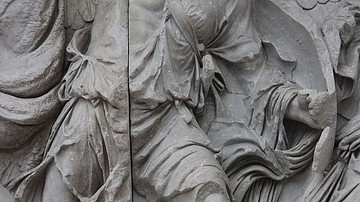
Definition
Uranus
Uranus (also spelt Ouranos) is the personification of heaven and the sky in Greek mythology. His Roman counterpart is Caelus. Gaia (Earth) gave birth to Uranus and chose him to be her equal. She lay with him, resulting in the birth of the...
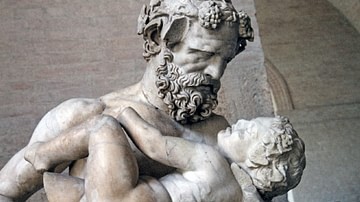
Definition
Zagreus
In ancient Greek mythology, Zagreus is a god closely associated with the wine god Dionysus, the underworld, and hunting. A son of Zeus and Persephone, he is known in the Orphic tradition as the first incarnation of Dionysus, whilst other...